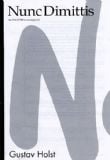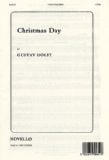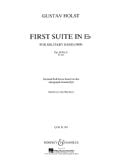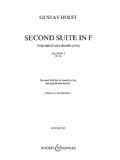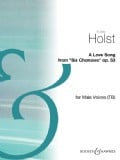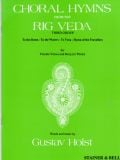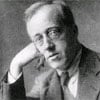
Gustav Holst
Everything about Holst’s most familiar music is quintessentially British, perfectly evoking rolling green hills, games of cricket in the sunshine and jam scones. Perhaps slightly ironic then, that Holst’s original name was Gustavus Theodor von Holst and he was born into a family of Latvian-Russian origin. Regardless of this fact, Holst’s work has remained incredibly popular as 'patriotic music' in Britain, with the use of the famous 'I vow to thee my country' from Jupiter perhaps being the most obvious example.
While some of Holst’s music was obscure in its experimentation with Indian harmonies and rhythms, the absolute polar opposite was The Planets, which was the classical equivalent of a smash hit with the public, and has become a staple in orchestral programming and classical 'best of' collections. The brilliance of the instrumental writing, inspired by Debussy, Ravel and Stravinsky, cannot be denied, and this has helped The Planets to travel internationally more than many other British orchestral works of the period. From the brooding, chilling evocation of war in Mars (written just before the outbreak of World War I), to the barnstorming jollity of Jupiter and the mysterious smoke of Saturn and Neptune, these are musical paintings of the highest order.
Although not of the same high profile as the astronomical orchestral suite, other works by Holst such as Egdon Heath and A Somerset Rhapsody contain orchestral writing of a similar level of virtuosity, and show a love of folksong shared with his contemporary Ralph Vaughan Williams. Holst’s blending of traditional melodies, European modernism and Eastern influences, provided an imaginative range of styles for future generations of composers, as diverse as Benjamin Britten, William Walton and Malcolm Arnold.
Bestselling Titles by Gustav Holst
-
Publisher: NovelloUsually despatched within 7-10 working days - Lead times may vary in the case of supplier shortages or delays$4.38
-
-
Publisher: Boosey & HawkesSpecial Order: Usually despatched within 20-30 working days - Lead times may vary in the case of supplier shortages or delays$21.58
-
Publisher: Boosey & HawkesSpecial Order: Usually despatched within 20-30 working days - Lead times may vary in the case of supplier shortages or delays$21.58
-
Publisher: Boosey & HawkesUsually despatched within 7-10 working days - Lead times may vary in the case of supplier shortages or delays$9.53
-
Publisher: Stainer & BellSpecial Order: Usually despatched within 10-15 working days - Lead times may vary in the case of supplier shortages or delays$10.10



